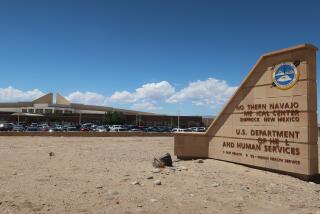Those Without Insurance Die Prematurely, Report Says
- Share via
WASHINGTON — More than 18,000 working-age adults died prematurely in 2000 because they lacked health insurance, according to a report released Tuesday by the Institute of Medicine.
While previous studies have shown that the uninsured get less medical care and generally are in poorer health than people with insurance, this is the most comprehensive such report. It is also the first to calculate how many deaths are hastened by the irregular medical care, late-stage diagnoses of life-threatening conditions and nonaggressive treatment common among those without health insurance.
Contrary to the popular view that patients needing emergency medical care are treated equally regardless of their insurance status, the report found that even uninsured auto-accident victims and heart-attack patients received fewer hospital services and were more likely to die than patients with insurance.
“We assume that the uninsured manage to get the care they need, but the evidence refutes that assumption,” said Mary Sue Coleman, president of the Iowa Health System and the University of Iowa and co-chairwoman of the committee that wrote the report.
Overall, uninsured adults aged 25 to 64 with a heart attack, cancer, HIV infection or a traumatic injury are 25% more likely to die prematurely than such patients with health insurance, according to the report, funded by the Robert Wood Johnson Foundation.
The Institute of Medicine is a private research organization with a mandate from the congressionally funded National Academy of Sciences to provide advice on health-care policy.
“We hope this report will bring the health problems of the uninsured back to center stage and back to the public policy arena,” said Dr. John Z. Ayanian, associate professor of medicine and health-care policy at Harvard Medical School and a member of the report committee.
The growing ranks of uninsured Americans, who now number about 40 million, and double-digit health-care inflation have garnered the attention of policymakers. The Bush administration and many congressional Republicans have proposed a federal tax credit to help low-income families buy health insurance, while some Democrats favor the expansion of already existing programs, such as Medicaid.
But competing political demands and a shrinking budget surplus make government action unlikely any time soon, officials say. In this election year, prospects are dim even for more limited health-care proposals, such as a wildly popular Medicare prescription drug benefit, according to congressional insiders. Bitter partisan differences over how to help the unemployed buy health insurance--not at all, in the end--delayed and almost doomed the recently passed economic stimulus package.
Yet Tuesday’s report adds specific numbers and new authority to the growing awareness that “there are significant health consequences to going without health insurance,” Ayanian said.
The Kaiser Commission on Medicaid and the Uninsured, working with the nonpartisan Urban Institute, has produced similar results and is about halfway through a project to put dollar figures on the cost of not being insured--in lost education, wages and taxes and in more expensive acute care.
“As a society, as a nation, we are paying for the lack of health insurance,” said Diane Rowland, executive director of the Kaiser commission.
The Institute of Medicine study identified several factors that it said contribute to a shorter life expectancy for the uninsured:
* Because the uninsured often lack an ongoing relationship with a health-care provider, they are less likely to receive preventive care and diagnostic tests.
* As a result, life-threatening conditions, such as cancer, tend to be diagnosed at a later stage, when prospects for recovery are lower, and patients with such chronic conditions as diabetes, heart disease and kidney failure are less likely to receive proper monitoring and medications.
* When admitted to the hospital, uninsured patients are likely to receive poorer care, and their death rate compared with insured patients may be even higher. Uninsured car accident victims in Wisconsin were 37% more likely to die than those with private insurance, and uninsured heart-attack patients are less likely to receive angioplasty or undergo surgery.
Health insurance is most effective for individuals who are not yet ill, the report concludes. But adults who already have chronic conditions or are in late middle age and, therefore, are more likely to need health care would benefit most from getting health insurance.
In addition, new insurance coverage could help reduce some of the racial and ethnic disparities in health-care delivery, Ayanian said.
More to Read
Sign up for Essential California
The most important California stories and recommendations in your inbox every morning.
You may occasionally receive promotional content from the Los Angeles Times.













